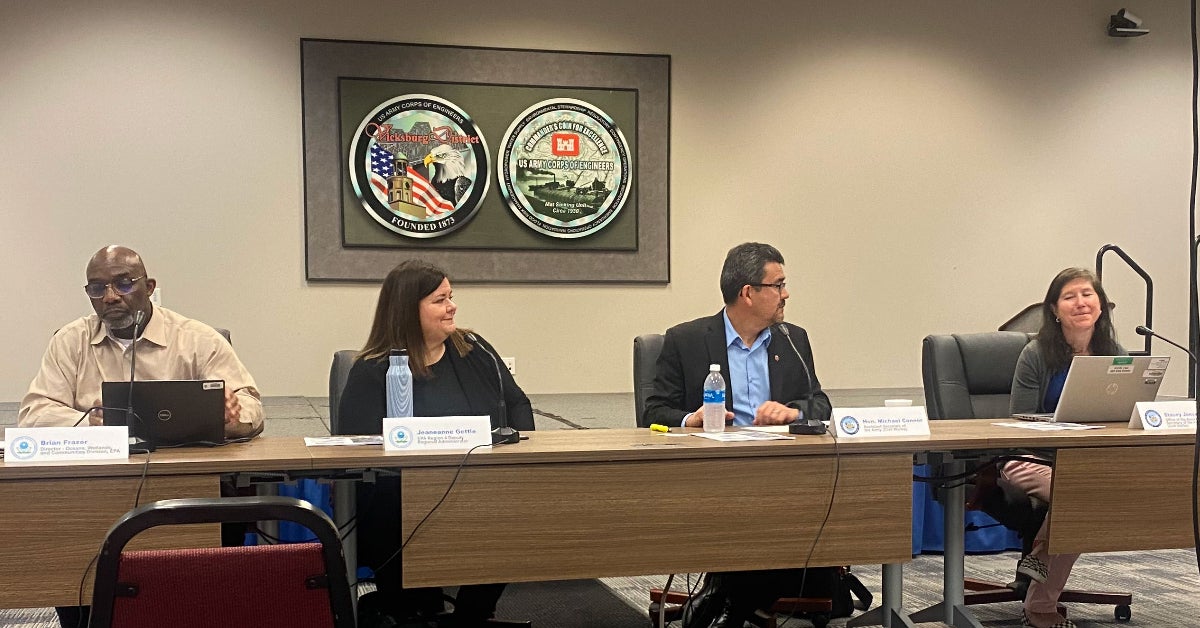VIDEO: Army, EPA say this time is different for Yazoo Backwater Project
Published 4:20 pm Thursday, February 16, 2023

- Brian Frazer, Director of the Oceans, Wetlands and Communities Division, EPA; Jeaneanne Gettle, Director of the Water Division, Region 4 for the EPA; Assistant Secretary of the Army for Civil Works Michael Connor and Stacey Jensen, the Acting Director of Policy and Legislation in the Office of the Assistant Secretary of the Army for Civil Works hosted meetings at the Vicksburg District on Wednesday. (Photo Submitted)
Representatives from the Department of the Army and Environmental Protection Agency had a message for South Mississippi Delta residents on Wednesday: “This time around, things will be different.”
During a series of community engagement sessions that lasted a combined 10 hours, the Assistant Secretary of the Army for Civil Works Michael Connor said he wanted to ensure residents that their feedback was taken seriously and, as a result, the next iteration of flood solutions for the Yazoo Backwater Area will come at an accelerated pace.
“We are committed to working together, we are committed to reducing flood risks and supporting the community’s different needs with respect to that flood risk, whether it’s effectuating a flood control plan that addresses your past issues, whether someone wants to relocate or what other features might be important to reduce flood risk, non-structural, or can we integrate other features,” Connor said. “But this time, we want to do it with longevity in mind to ensure that we’re complying with the environmental laws. So, the bottom line is we’re committed to moving forward in this time period.”
Attending the meeting with Connor was Jeaneanne Gettle, Director of the Water Division, Region 4 for the EPA; Stacey Jensen, the Acting Director of Policy and Legislation in the Office of the Assistant Secretary of the Army for Civil Works; and Brian Frazer, Director of the Oceans, Wetlands and Communities Division, EPA.
Gettle stated her primary goal for the meeting was to find a sustainable solution for the backwater.
“EPA knows that the flooding in the Yazoo Backwater Area is a significant problem. And we understand that you’re frustrated,” Gettle said. “We are absolutely committed to working with Army to find a sustainable solution, the durable solution Mr. Connor described.”
The meeting is part of an “aggressive” five-month timeline that began in January with the Department of the Army and EPA releasing a joint Memorandum of Collaboration on the project.
The timeline was dictated as follows:
JANUARY
- Joint Army-EPA Collaboration Memorandum in place
- Establish external engagement strategy
- Project delivery team identified
FEBRUARY
- Deliver agreed-upon process to establish scope of wetland impacts
- Finalize criteria for any compensatory mitigation needed for a future project
- Initiate external engagement
MARCH
- Mapping products delivered
- Deliver agreed-upon wetland functional assessment criteria
APRIL
- Stakeholder engagement on preliminary findings recommendation
MAY
- Synthesize analysis and stakeholder feedback into a recommendation
JUNE
- Army delivers preferred approach(es) for flood risk reduction solution(s) for the Yazoo Backwater Area
Response to Feedback
Over the course of five sessions, which were held at the Vicksburg District Headquarters in Vicksburg and served as a follow-up to the Aug. 24 meeting in Rolling Fork, area residents gathered to share their testimonials about the impact of Yazoo Backwater Flooding on their lives.
At the halfway point during the day, both Connor and Gettle said they were thankful for community members who felt led to share their stories.
“I think that we consistently hear the significant impact to the people, the business, the economy of the area. And I think that that is what is really a driver in us,” Gettle said. “We have to come together and we have to find the solution and the reason we are doing business differently.”
Connor echoed Gettle’s sentiments, adding that the distinct difference between past attempts to complete the project is the commitment between their agencies to work together.
“There’s an equal commitment to finding a solution to address the fundamental issue of flooding,” Connor said. “That is the difference that we highlighted. We thought it was important to document what our shared goals are, as well as some specific issues that we needed to work through. So I think we have the same goal.
“Today, I was interested to hear more about the problems with recovery. It’s so hard, even with money being thrown around, there’s still the bureaucracy and red tape and all the issues,” he added. “You can never fully recover and you get further behind. And I hadn’t really focused on that last time, but I think it came out, particularly this morning.”





